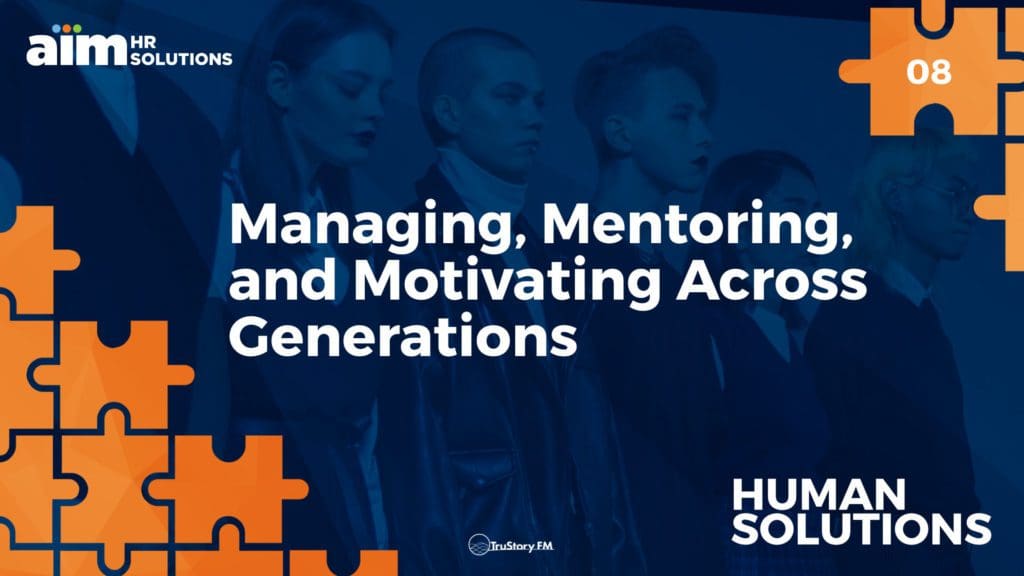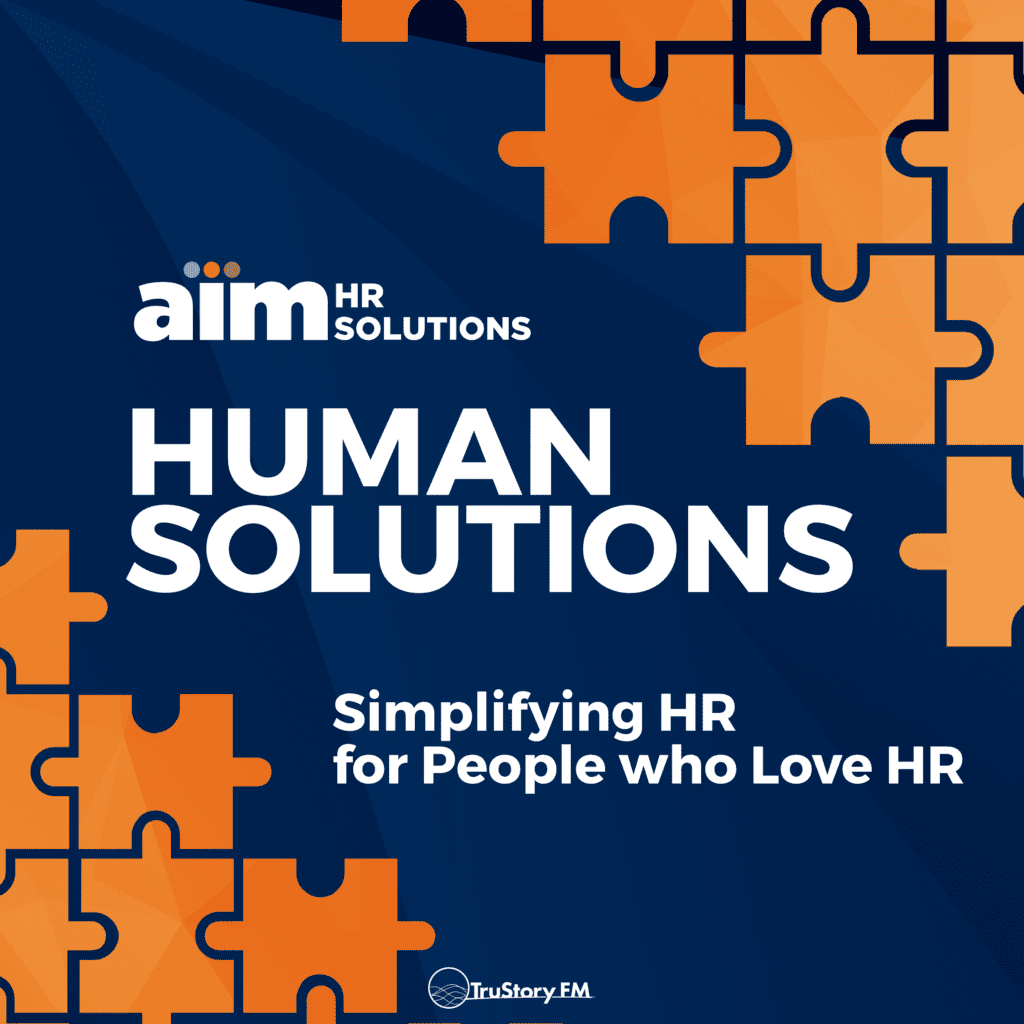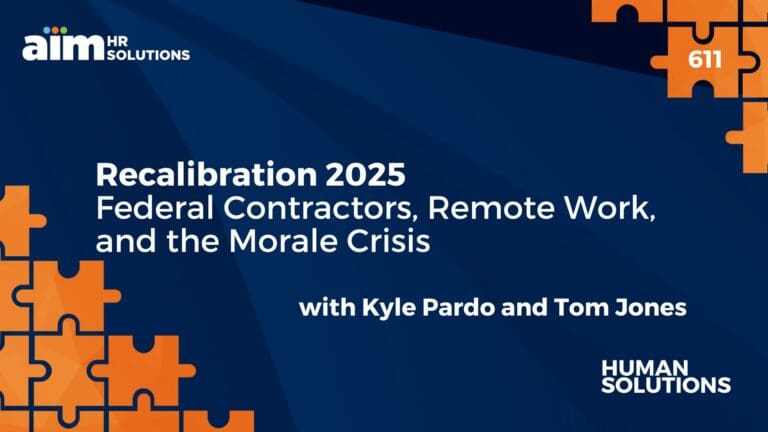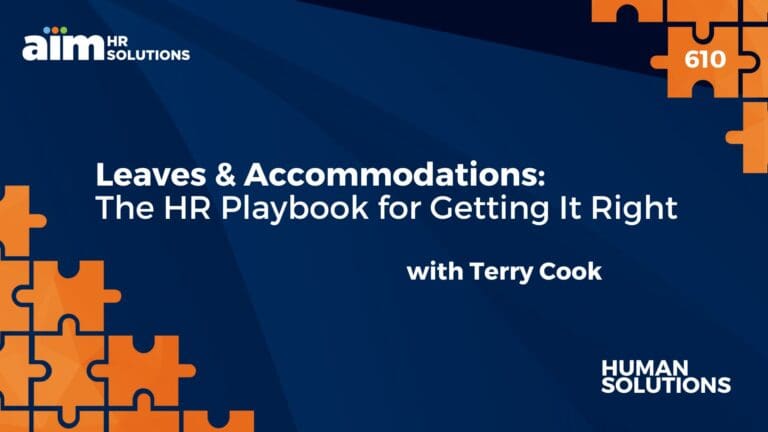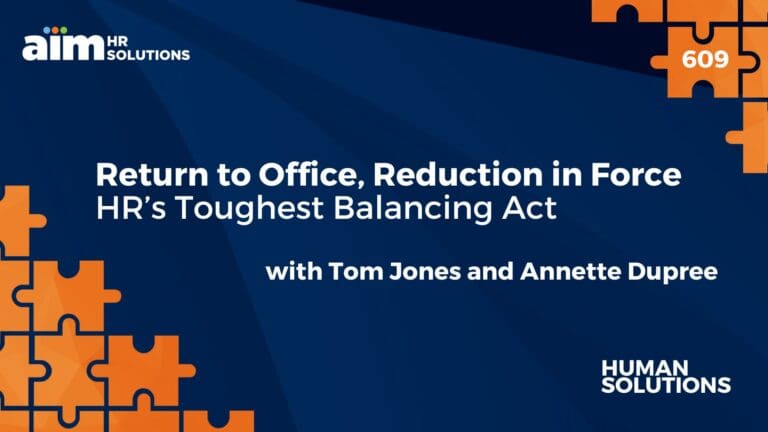Gen Z is in the workplace! Who are they? How are they different from millennials? And why has everyone forgotten Gen X? Dudes, will no one gag me with a spoon?
This week, we have our own Gen Z’er is in the spotlight, along with her Millennial counterparts. Jen Moff, our VP of training, Jillian Derby, our senior marketing director, and Kallee McGraw our events support specialist spill the tea on what makes this generation tick and what your company should be thinking about when it comes to attracting, retaining, and fostering relationships across generations at work.
Episode Transcript
Pete Wright: Welcome to Human Solutions, simplifying HR for people who love HR, from AIM HR Solutions on True Story FM. I’m Pete Wright. And, hey everybody, gen-Z is in the workplace. Who are they? How are they different from millennials? Why has everyone forgotten gen-Z? Dudes, will no one gag me with a spoon any more? Our own gen-Zers in the spotlight today: We’ve got Kallee McGraw, our event support specialist, Jen Moff, our VP of training and Jillian Derby, our senior marketing director. We are going to spill the tea on what makes this generation tick, and what your company should be thinking about when it comes to attracting, retaining, and fostering relationships with gen-Z talent. Hi, everybody. Welcome. I feel very, very old in this conversation.
Jen Moff: You’re only as old as you feel you are.
Jillian Derby: Age is just a number.
Kallee McGraw: You’re so young.
Jen Moff: Age is just a number.
Pete Wright: There you go. I’m young on the inside. Except inside my knees, they’re also old. So we’re talking about gen-Z. Gen-Z is in the labor market. Let’s start briefly with generational audit, where you see yourselves. And the generation labels that you embody. So Kallee, starting with you. You are officially our gen-Z.
Kallee McGraw: I am, and in Jillian’s standards, I’m a geriatric gen-Zer as well.
Jillian Derby: I did not say that.
Pete Wright: All right. So Jillian, where are you?
Jillian Derby: I am 1984, so I am a geriatric millennial.
Pete Wright: Oh my goodness, okay.
Jillian Derby: I know, it sounds so appealing.
Jen Moff: You sound very young, for being as geriatric as you are.
Jillian Derby: Thank you.
Pete Wright: Jen Moff, where are you?
Jen Moff: I’m an early ’82 baby. So I’m part of that xennial. So the overlap between gen-Z and millennials. So there’s a lot of fun to be had.
Pete Wright: Okay. So, it’s fair to say that you probably saw the movie Reality Bites, but you might not remember it as your anthem. Is that fair?
Jen Moff: 100%.
Pete Wright: All right. See, I am ’72. I am square in the middle of gen-Z, the forgotten generation. Really what we are known for, I think most, is the California skater boy vowel shift and some language stuff. So let’s then talk about what we are getting out of these generations. What are the generational splits? Anybody have the actual years in front of them for what generation we’re looking at right now?
Jillian Derby: So it’s important to preface that there’s different variations on this. So this is just one variation that I found, the years can change depending on who you ask. But we got boomers from about 1946 to 1964. We have gen-Z from about 1965 to 1979, 1980. Millennials from 1980 to about 1994, 1995-ish. And gen-Z from 1996 to 2012.
Pete Wright: One of the things that I know is that the definitions of what makes a generation, those years tend to fluctuate as we get further from it. So it’s much easier to define the boomer generation now, because it’s not really changing that much anymore. But what will be defined as millennial and gen-Z, is still a little bit in flux. But we do have a sense of what some of those characteristics are that define the work behaviors on those generations. So, millennials and gen-Z, okay. As the oldest one, as the gen-Xer, they seem very fluid to me. I don’t know what the differences are between millennials and gen-Z. Who could help me differentiate between the two? Do we start up and go down? Or do we just let our gen-Zer lay into us?
Jen Moff: I think we let the gen-Zer tell us how cheugy we are.
Pete Wright: We’re so cheugy, no cap.
Jillian Derby: What is "cheugy"?
Jen Moff: Oh, Jillian, we’ll school you.
Pete Wright: All right Kallee, I have the Buzz Feed quiz open. We’re going to end with that. So, all right Kallee, tell us what we need to know about you.
Kallee McGraw: I think there are a lot of similarities, but for the most part, the big three differences I would say are that gen-Zers really like to work independently, where millennials like to really collaborate in the workplace. Or at least in general. And I don’t think that’s necessarily true for us. And that’s actually something I really saw between my grad school program, and undergrad. Is just the different generations that were in those groups. They just really work differently together. We also really are entrepreneurial and creative go-geters. Not to say that millennials aren’t, but, that’s just really one of the big generalizations there. And we also really do value flexibility in the workplace.
Pete Wright: How does this all define your experience with the pandemic, and remote work, millennials versus gen-Z? What are some expectations there?
Kallee McGraw: Actually, it’s really difficult. This is something I was really thinking about too. My entire experience in the workforce has been through a pandemic, and I think the pandemic triggered a lot of changes in the workforce where a lot of people were moving to become remote and starting to have more insight into each other’s lives. The work-life balance line really got blurred throughout the pandemic. And, I think that’s something that as my generation comes into the workforce, that is something that is going to continue to happen because, that is a value for us. So, I think that the workplace is going to become a bit more casual and the pandemic was a big trigger for that.
Pete Wright: How excited are you to go to an office? Right now, just everybody says, "Hey, okay, office is open and we want you in this cubicle".
Kallee McGraw: Well, I would say I am really someone that is for remote work, and-
Pete Wright: Listen to how diplomatic you are, though. That’s really fantastic.
Kallee McGraw: Yes.
Jen Moff: So gentile, and delicate, and how you responded. Loved it.}
Pete Wright: But I think this is really important. So Jen, to you, in terms of expectations of what employers need to be ready for, and need to be sort of building infrastructure for, that’s changing. And it doesn’t feel like there’s a whole lot of room in terms of who we have in the available staffing pool that we need to build up in our organizations. Doesn’t seem like those expectations are going to change.
Jen Moff: Yeah. I would agree with you. Prior to my working for AIM HR Solutions, I was approached to do some work for a very large company based in Massachusetts. And, when I was chatting with the representative about things, one of the things that gave me a, "I don’t think this is a good fit for me", is they were a 100% in office, would not do any flexibility on remote work. There was nothing. It was, you are in the office every day, from this time to this time, in this blah-blah-blah-blah-blah environment. And, I’ve also owned my own business for years. And so I’m used to working from home, and I know what you can get done anywhere from a computer, as long as you have the resources. So, with so much technology available, how do we, not necessarily, sell companies on the idea that remote work is the way to go. But like Kallee said, the pandemic triggered a major change. And a lot of times in my experience, people don’t change until the pain of their circumstances becomes necessary. And so I think we’re all really lucky in many ways. I tend to look for the silver lining, so to speak, or the benefits of certain situations that are challenging. So for me, I look at the pandemic as being a real gift in advancing the way that we do business, and the way we run companies, and how we can train remotely, and support people, and attract talent from across time zones. Because the limitations that we once had aren’t in place anymore.
Pete Wright: I’ve been reading more and more, that the assumption that being in person and working in teams together, that we have long held as the ultimate in fantastic workplaces, that teams can collaborate together, they can sit down and see each other in the eye. That that is an assumption based on increasingly thin research, that it’s becoming a fallacy. And in fact, the tools that we have to work together remotely are actually filling holes we never thought would be able to be filled interpersonally. Jillian, to you. What do you think about this trend for teamwork and collaboration, and how it is impacting our generational awareness at work?
Jillian Derby: So I think, being a millennial, we were told that we love collaboration. We love open office concepts, and this would be the way of the future. So I remember I worked in one particular organization, and they said, "We’re moving you all into one big open space". And you could see everybody all day, and it was going to be great. It killed my productivity. I would go home and have to work at night because all day I was bombarded with someone’s phone ringing, somebody just stopping by, someone eating lunch. Whatever it might have been. It was so disruptive to my day to day, and never mind trying to take a call from my desk. So collaboration in the workplace for millennials, yes, millennials love collaboration. But I know that for myself, I need that time where I can also have independence from that. And I think bringing the work from home piece, that’s huge. So there’s a lot of companies doing this hybrid approach now, where you have meetings in the office, you get that face to face element that for some people is really important. But you also can take meetings at home, or do your writing at home, or whatever it might be.
Jen Moff: I think it’s interesting, Jillian, what you were talking about there. I could almost see like, Pete’s over here on the left and Jillian’s over- not Jillian, pardon me. And Kallee’s over here on the right. And the millennials are this transitionary period. So it’s like a Venn diagram, and in the middle is the millennials and the things that they liked, that kind of occupy both spaces.
Pete Wright: I think that’s so interesting. And I’m striving to be more millennial, honestly, more and more Gen-Z. I notice it specifically, because I’ve worked now with Jillian for a number of months. And one of the things that it only occurred to me this morning, is a certain behavior around when we have conversations together face to face. In the early days of my career, the phone existed to pick it up and call someone impromptu. If you just need to talk to somebody for five or 10 minutes, you just called them. And, I noticed that Jillian never does that with me. She always sends me an email and says, "Do you have time to schedule a quick phone call for five or 10 minutes?" And I find that a delightful relief, it is the best. Can we make all gen-X and older understand how great it is to just reach out and ask people if it’s okay? It is. And I’ll go back to Kallee. I don’t know if you’ve been in the workplace long enough to be able to reflect on the weird communications power vacuum that exists when you’re collaborating with people versus when you just need to get your stuff done. Does that mean anything to you?
Kallee McGraw: Oh yes. That’s something I’ve totally seen. And, I think that I just work differently than a lot of the people I work with. And, sometimes I’ll want to just jump in and get something done quickly independently. But I realize that it’s more of a bigger process where people are collaborating, and talking to each other, and everyone needs to be involved and tied in. But also the different communication styles are crazy in the workplace. Yeah, it’s something that I hadn’t experienced before, and then it really became evident.
Pete Wright: Because when did you start at AIM?
Kallee McGraw: I started end of September 2021.
Pete Wright: 2021. So, 21, 22, 23. So really early 2024, late 2023. You’re going to be out of here. So let’s talk about how long generations are staying at work because gen-Z, the average time that a gen-Z employee stays at a company is two years and three months. So the clock is ticking. For millennials two years and nine months. Even you, geriatric millennials, you’re not going to be there that long. So what is it that we can say right now before you all leave this podcast that might inspire you to stay at your organization? What are the things that each of these generations is looking for and expecting to stick around? The greatest fear that someone like me has is losing institutional knowledge, bleeding institutional knowledge. And keeping people for longer periods of time, helps us to build that institutional knowledge. Where do we start?
Jen Moff: I think about this because Kallee is been super helpful to me. I’m on my sixth week with AIM at this point. And I, like her, had to navigate the different communication patterns, and learning different people prefer this way, and that other people prefer this way. And I think about what I might like long term, and what my goals are coming into the role, and putting together a plan for the next three to five years. But also being a 100% realistic with, with the data that’s out there, and with what I think we all know about ourselves. Like what our values are, and what we need. So for me to stay in any kind of relationship, because let’s be honest, that’s what it is. It’s a relationship between myself, and the company, a relationship with both myself, and other colleagues. I need to feel valued. I need to feel respected. I need to feel like I can leverage the things that I am amazing at, and the things that I get energized by. The more that I can’t do those things, the less of fulfillment I feel, and the more longing I’d feel to find those things again. So, as long as a company is creating opportunities for individuals like myself, for example. Or any other millennial or gen-Z person that is less than three years statistically to stay. We really need to have ways that we can, I think, highly contribute the things that we’re interested in. And have opportunities to grow, have opportunities to be developed. Jillian, Kallee, tell me how you’re feeling about this too. I don’t know that I necessarily need upward mobility, as much as I need opportunities to continue developing my self-skills, and other different tasks and things that are of interest to me.
Jillian Derby: It’s interesting you talk about that. One thing that I’ve come across with thinking about, how do you stay at a company long term? Especially when attracting gen-Z and millennials, and things of that nature. Was, gen-Z doesn’t really look at the corporate ladder, they don’t seem to care about that as much as they care about learning different things. And I’ve seen this with Kallee. Kallee’s doing a little bit of everything for different departments in the organization. But think of it as moving to lateral departments. Opportunity that may not be within the same department, but giving them exposure in coaching on different things that they may be interested in. That you may be like, "Oh, that’s outside of their job description". But if you are able to retain the talent internally in some capacity, that’s a win as well.
Kallee McGraw: Yeah. This is tricky, because I feel like gen-Z has a bad rep of just jumping companies, and not wanting to stay. That’s something that I see and hear a lot. But I think it’s really just that we value finances, we value growth and reassurance. So I think those are some major things. And then getting a new job, that’s just an instant way to boost your salary in most cases. And an instant way to get that gratification that someone wants you to work for them. So I think, if companies can provide that internally, that’s something that will keep people.
Pete Wright: I think that’s a really important observation. That you’re not looking for new reasons to leave the company, the moment you start working there. You’re constantly looking for reasons to stay.
Kallee McGraw: Yes.
Jillian Derby: There was one concept that I’ve seen floating around in the HR space called stay interviews. So when a company you go to leave, they give you an exit interview. Tell me all the reasons you’re leaving, because of how terrible we are. But instead it’s managers meeting with their current employees to say, "Okay, what would it take to make you stay? What could we do differently to have you to retain you?" And I think that’s a much more productive conversation, because you’re retaining your talent before they go.
Jen Moff: I love that you just said that. Because one of the questions I ask when I’ve been interviewed at places is, "What brought you here?" I’m the interviewee, they called me because I’ve applied or they’ve recruited me somewhere. I’ll always ask the interviewer, "What brought you to the company and what keeps you there?" Because I think that is such an important question.
Pete Wright: I think we can say collectively that this podcast slaps, it’s a real bob, we’re really vibing the mood.
Jen Moff: Kallee’s looking at you real unhappily, Pete.
Pete Wright: No, you’re the one that sus, Jen. You’re sus. I don’t know, am I doing any of this right? Do I know how to do any of this stuff?
Kallee McGraw: You are, you got it.
Pete Wright: I got to go play some Fortnite right now, you guys. This has been too much. I wanted to do a little quiz, mostly for Jillian, but now I’ve just used all my terms. I think this is a really interesting conversation, particularly valuable to have representation across the generational spectrum. Mostly because my sense is that, when we’re talking about millennials and gen-Z, we’re usually talking about millennials and gen-Z and not to millennials and gen-Z.
Jillian Derby: Correct.
Jen Moff: There was a guy, Pete, that I saw recently in a, I think it was a TikTok. And he was talking as if he had no idea that millennials were at the 40 year age range now. This person said, "Are millennials even in the workforce yet". And I was like, "Oh my goodness gracious".
Pete Wright: Yeah, it’s a little bit shocking. But to the same point, we’re all the star of our own movies. It takes work to get outside of our own heads and change our perspectives. And I think this kind of conversation is particularly valuable in that regard. So to wrap us up, let’s just go down the list and, I want to hear a surprising thing from each of you about your generation, that you don’t think anybody else knows.
Jillian Derby: Something surprising about my generation, that we’re not all emo fans. I am, but I know plenty of people who weren’t. No, but that we’re pretty good with technology. Because we know both sides. I remember being at home and picking up the phone and hearing the dial up sound.
Pete Wright: Sure. Yeah, that was a fitting interpretation.
Jillian Derby: Thank you. But I also know how to use Facebook, I grew up using that in college. So I think we’re different than gen-Z. Gen-Z is more of this digital natives, they grew up only knowing this kind of life. Where millennials have experienced both. We know what it’s like to live in both worlds, and we can adapt a technology pretty easily.
Pete Wright: What’s your favorite communications tool?
Jillian Derby: Probably email or text messaging.
Pete Wright: Okay. Jen.
Jen Moff: Oh, this is such a good question, I’m glad you didn’t call on me first. It took me a second. I think the fallacy is that millennials are inherently selfish and narcissistic. That’s what comes to mind to me. I think there’s an opportunity that previous people born in different times, didn’t prioritize themselves and did a lot of self-sacrificing and self-neglect in the name of X, Y, or Z. And I think that millennials, we’re the byproduct of boomers and gen-X. And with each year, more and more people start taking care of themselves. And maybe that looks like selfishness to others, but it just looks like being the best version of you that you can be, so that you can be the best for whatever you’re involved in.
Pete Wright: And what’s your favorite communication tool?
Jen Moff: I really like a free app called Signal. It’s highly encrypted. It’s very similar to WhatsApp in that it’s free, and you can leverage it with people that have phone numbers outside of each country that you’re in. And you have the opportunity to send audio messages, which I like. And you can react to things in the same way that you would in Slack or something like that too, so that’s my favorite.
Pete Wright: Excellent. All right Kallee, it’s all you.
Kallee McGraw: Well, I would say that something that I’ve really been hearing a lot is that gen-Z just doesn’t care, and we’re selfish and just don’t show up. Particularly for work and school. But I don’t think that’s a fair assumption. I think it’s just that mainly for work, we just value other things outside of work. And we may work hard and might not work in this nine to five. I do, but things may look a little different for gen-Z, but it doesn’t mean that they don’t care. It’s just, they might work more efficiently, or might have other values.
Pete Wright: I can’t believe I’m finally old enough to say this, but I’m old enough to remember my boomer parents saying exactly the same stuff about me as a gen-Xer. I don’t know if that’s a good thing, but in the spirit of history, it will teach us something. That’s maybe something you have to look forward to in 25 years. What is your favorite communication tool?
Kallee McGraw: Snapchat.
Pete Wright: There we go. That’s the big one. That’s the big lesson for all of us. Thank you all very much, this has been such a fun conversation. And I sure appreciate all of you, and your time and wisdom, Jen Moff, Jillian Derby, and Kallee McGraw. You’re great, thank you. On behalf of all of these wonderful people, I’m Pete Wright, and we’ll catch you next week, right back here on Human Solutions, simplifying HR for people who love HR.







